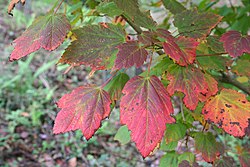Acer spicatum
| Habit | tree
| |
|---|---|---|
| Height: | ⇕ | 30 ft"ft" can not be assigned to a declared number type with value 30. |
| Width: | ⇔ | 15 ft"ft" can not be assigned to a declared number type with value 15. |
| Lifespan: | ⌛ | perennial |
| Bloom: | ❀ | early spring, mid spring, late spring |
| Exposure: | ☼ | sun |
|---|---|---|
| Features: | ✓ | deciduous |
| USDA Zones: | 4 to 8 |
|
Acer > |
spicatum > |
Acer spicatum (Mountain Maple) is a species of maple native to northeastern North America from Saskatchewan to Newfoundland, and south to Pennsylvania. It also grows at high elevations in the southern Appalachian Mountains to northern Georgia.
It is a deciduous shrub or small tree growing to 3-8 m tall, forming a spreading crown with a short trunk and slender branches. The leaves are opposite and simple, 6-10 cm long and wide, with 3 or 5 shallow broad lobes. They are coarsely and irregularly toothed with a light green hairless surface and a finely hairy underside. The leaves turn brilliant yellow to red in autumn, and are on slender stalks usually longer than the blade. The bark is thin, dull gray-brown, and smooth at first but becoming slightly scaly. The fruit is a paired reddish samara, 2-3 cm long, maturing in late summer to early autumn.
The tree lives in moist woods in rich, well-drained soils on rocky hillsides and along streams. It also grows on ravines, cliff faces, and forested bogs. During ecological succession, it colonizes the understory as pioneer species die.
Read about Acer spicatum in the Standard Cyclopedia of Horticulture
|
|---|
|
Acer spicatum, Lam. (A. montanum, Ait.). Mountain Maple. Shrub or small tree, rarely 30 ft.: lvs. 3-,or slightly 5-lobed, coarsely serrate, pubescent beneath, 2 1/2-4 1/2 in. long: racemes rather dense, long, upright: fr. with diverging wings, bright red in summer. E.N. Amer. —Valuable as undergrowth; lvs. turn yellow and scarlet in fall. Var. laciniatum, Jouin. Lvs. deeply and irregularly lobed and incised. CH
|
Cultivation
- Do you have cultivation info on this plant? Edit this section!
Propagation
- Do you have propagation info on this plant? Edit this section!
Pests and diseases
- Do you have pest and disease info on this plant? Edit this section!
Species
Gallery
If you have a photo of this plant, please upload it! Plus, there may be other photos available for you to add.
References
- Standard Cyclopedia of Horticulture, by L. H. Bailey, MacMillan Co., 1963
External links
- w:Acer spicatum. Some of the material on this page may be from Wikipedia, under the Creative Commons license.
- Acer spicatum QR Code (Size 50, 100, 200, 500)



